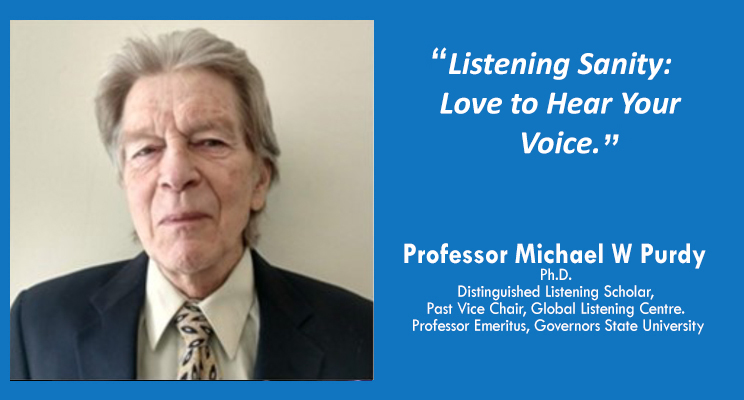
Listening Sanity: Love to Hear Your Voice.
Professor Michael W. Purdy, Ph.D.
Distinguished Listening Scholar,
Past Vice Chair, Global Listening Centre.
Professor Emeritus, Governors State University. USA
This summer I found a fascinating article* that argued for a helpful approach to mental illness and
the road to mental health. In general, we can use the listening practice described in this article as a way of helping others in our daily lives. This receptive style of communication is a listening practice that works to help individuals with problems to express themselves, but in no way claims that the helper be a therapist—licensed or not. The article depicts situations where the typical solutions are not working well enough, and a listening ear can be useful. The article told of group homes where staff were trained to listen. They start by listening as “being with’ [which] carried out above all by . . . com- panions— paid interns whose ameliorative mission is simply to be engaged, empathetic and curious, to leave residents feeling less alien, less alone.” In one situation: A [staff member] “asked (the patient) about his experience, listening openly, no more, no less,” no imposition, and no labeling. With the stresses of modern society, we are often haunted by the inner voices seeking expression.
The very idea that listening openly and listening were central to helping people got me thinking about how listening to those who have a voice they need to express is so important in these trying times. All of us in tough times and situations want and need to express what is bothering us. However, that expression is not meaning- ful unless someone is listening in an “engaged, empathetic and curious” manner—not listening for some outcome, but just listening with —-, being respectful and present, letting someone know they have been heard. Attending to another who needs a listening ear is a special gift we can offer, and one we all can master. This may not be the role everyone will want to play, and this practice does not imply any shoulds or oughts.
David Oxberg has famously said: * “Being listened to is so close to being loved that most people cannot tell the difference.” And loving care is what heals people if only we care to listen. I know that listening with care is a big ask in these times when everyday life can be so challenging, people often feel that they are not being heard or understood; if not listened to, they may feel dismissed. But there is also great joy and a feeling of acceptance when we support someone by the simple act of listening “with.” In the art of listening to another, we also need some ideas for how to act in the real situation. There is a great deal of research and a variety of practical suggestions about how to listen in a caring way, and every culture has an ethical structure that supports serving others. It helps if the situation and environment are safe and conducive to effective listening. We can think of our role as supportive and helpful, with no intention or behavior that directs the conversation—only the commitment to do our best, trust that the speaker is authentic, and to be surprised when things go well. The best strategy in helping situations is to use minimal reactions, at first: “I see,” “um hmm,” or silence; and not jump to conclusions but follow the speaker—affirm and build on what you hear. We can build on what we hear from the speaker with questions, keeping it non-judgmental and non-directive
–that is, questions that don’t impose but encourage more conversation. At the basic level are Clarifying questions which mirror or clarify what has been said. Second are Paraphrasing questions which check for accuracy of facts and feelings, to make sure we understood what was related. Finally, there are Summarizing questions which seek to establish the accuracy of our interpretation of the speaker’s message: “Did I hear that right”? There are many more questioning modes, but questions beyond what we have laid out here tend to focus on the listener’s agenda rather than on an individual who wants to express their concerns. In any event, the goal is to provide a safe and welcoming space for someone to share, and even vent; therefore, attention to how it is done is most important. Listening is as much about our attitude, and willingness to focus our attention, as it is about specific instructions.
Receptivity, being able to listen and support another human being, is a universal goal and an art to be cultivated. We may only wish for more individuals who will rise to the task of artful listening. What we do as individuals shapes our communities and affirms all of our lives.
